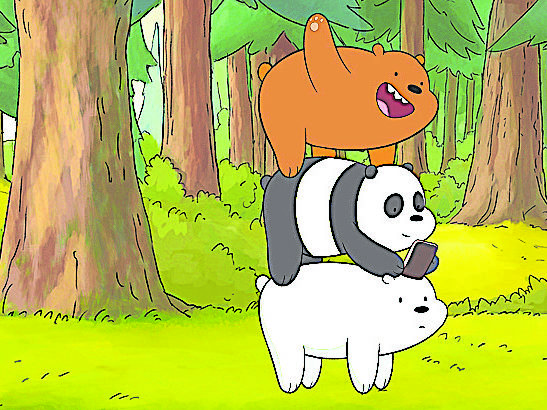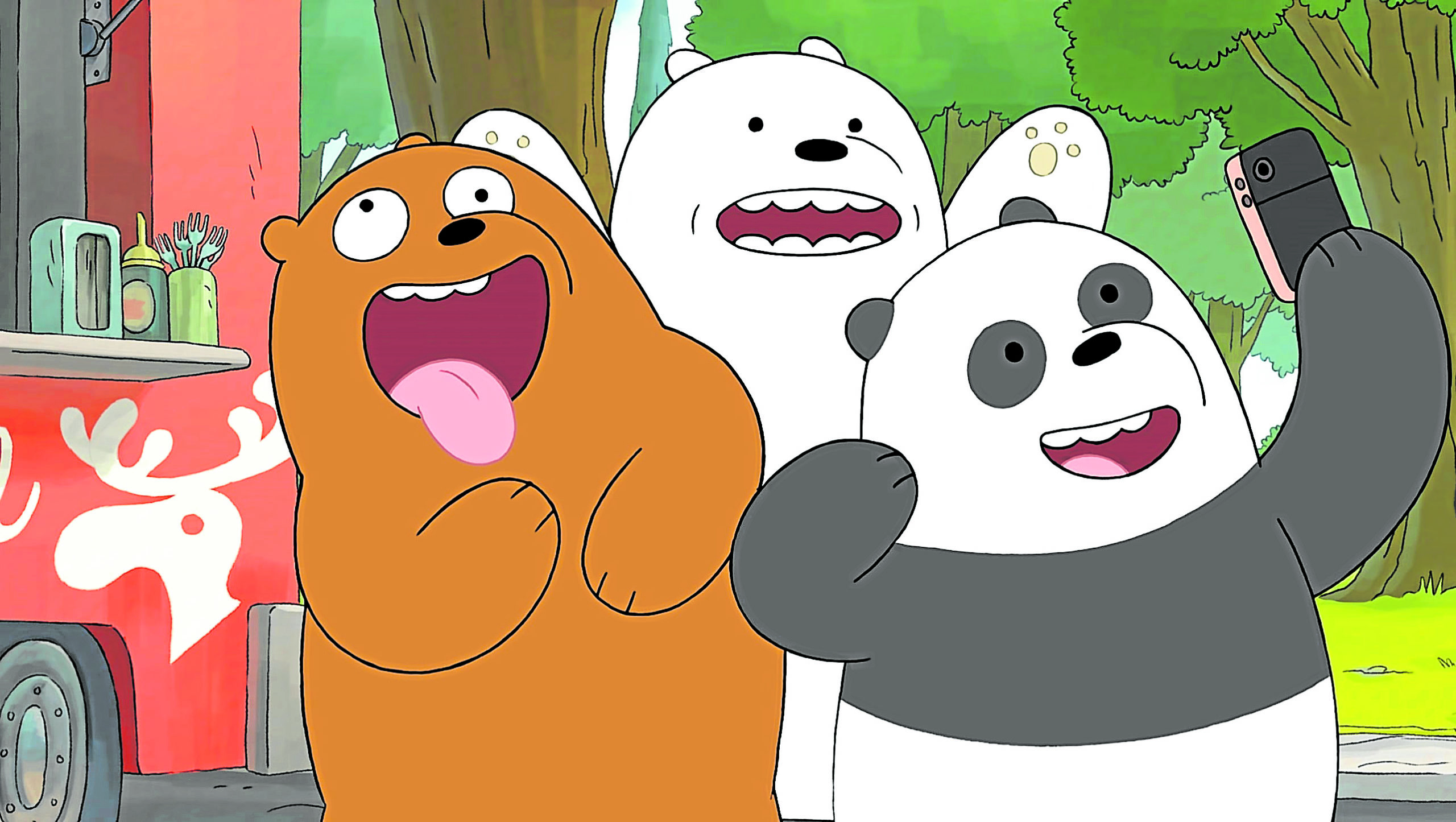Five years after their first awkward attempts at integrating themselves into the human world, Grizz, Panda and Ice Bear are set to say farewell to their avid followers in the TV movie, “We Bare Bears: The Movie,” on Saturday.
After winning viewers’ hearts over four seasons, the trio will ride into the sunset with a grateful heart by way of a cross-platform rollout on Cartoon Network (at 11 a.m.) and other WarnerMedia channels like Warner TV, HBO, HBO Family, Boomerang, the streaming service HBO Go and the Cartoon Network Watch and Play app.
“We Bare Bears” creator Daniel Chong is just as thankful to the fans as the loud and adventurous Grizz (voiced by Eric Edelstein), the kind but nervous Panda (Bobby Moynihan) and the quiet and mysterious Ice Bear (Demetri Martin)—who have been playing out the good-looking 41-year-old artist-animator’s thoughts as a minority living in America for years.
“There’s actually some poetry to this being the last of it,” the 41-year-old, Bafta-winning and Emmy-nominated artist-animator told us in a recent video interview. “Unfortunately, pulling the plug on the series wasn’t my choice—and I think the studio made the right decision. I’m just happy we happened to write something that changed the whole concept at the end that allowed us to tie up the movie’s thematic ideas with those of the series.”
Asked how it felt to say goodbye to a show that means so much to a lot of kids, Daniel mused, “It’s rough. But honestly, you don’t really have a lot of time to reflect on something like this while you’re making the series and going at full speed every day. The schedule was so hard I was just desperately making sure that nobody was behind.
“So, it’s only now that we had wrapped up the show (“Panda’s birthday,” the 140th episode, premiered on May 27 last year) and the movie is over that I can look back and be wistful about what it used to be and what those times were like. It’s just kicking in.
“I am touched that people still want to keep it going, but it’s hard to look back. We did 140 episodes and a movie—and that’s a lot! I feel like I’m ready to move on. There’s a spinoff down the road, but while I won’t be part of it creatively, it’ll be in good hands—and I’ll still be an executive producer on it. Moreover, you also don’t want to overstay your welcome. I’m just glad the movie was able to put a nice bookend to the show.”
The film’s sprint to the finish line wasn’t without its roadblocks, Daniel admitted: “The difference between making a movie and creating 11-minute episodes lies in the story itself, which is hard to control.
“We screened the film halfway through production and realized we messed up—something was wrong—so we had to throw away more than one-third of the movie. Luckily, we had enough time to fix it!
“But this is where it gets even more interesting: We wrapped up in March. The day we were supposed to finish the movie was the day before we went into quarantine! If we didn’t finish as scheduled, there wouldn’t be any movie now because most mixing houses in America are closed—you can’t go in and work. We really lucked out!”
The film gives Grizz, Panpan and Ice a fitting and thematically provocative finale, with a prescient metaphor reflecting on how man’s way of life has since been upended by recent socio-political upheavals and a global health crisis—but, hey, no spoilers here.
Just the same, this synopsis about the production is as good as any: Life is good for the lovable trio, but when their love of food trucks and viral videos get out of hand, it catches the attention of the menacing Agent Trout from the National Wildlife Control, who pledges to restore the “natural order” by separating them forever.
Chased from their home, Grizz decides there’s only one thing they can do to find refuge—move to Canada! The bears then embark on an epic road trip filled with new friends, dangerous obstacles and massive parties. But the perilous journey will force the bears to face how they first met and became brothers, in order to keep their bond as a family from splitting apart.
It’s this sudden burst of nostalgia surrounding the show that gave us an opportunity to take a trip down memory lane with a trivia-heavy Q&A and go back to how it all started for Daniel and his trio of burly “We Bare Bears” creative muses:
Why did you make a TV show about bears?
I was in a library with my girlfriend’s 6-year-old niece, and I was just doodling to make her laugh. For some reason, three bears were what came out of my head and my hand—and she found it funny. Soon enough, I had three bears stacked on top of each other—and that was that.
It wasn’t a premeditated idea. At the time, I was living in the Bay Area, where bears are a big deal. I was just trying to make a child laugh.
Why are they stacked in the order they’re in?
Much of it is just random. When I created the comic, which is what the show is based on, they didn’t really have established personalities. But when I started adapting it into a TV show, seeing the stack—with Grizz on top, Panda in the middle and Ice at the bottom—gave me a sense of what their personalities should be.
I realized that maybe they were brothers. Grizz, the grizzly bear, is on top because he’s the eldest—the leader who decides which way they’re going. Panda, the middle child, is always kind of “different,” while the one at the bottom, polar bear Ice, is the youngest—nobody really pays attention to him. The stack gave me reason to define their characters, and everything came together.
Was the movie your idea?
Yeah, it was. Before “We Bare Bears,” I was working in animation for about 10 years at Disney-Pixar as a storyboard artist (“Inside Out,” “Cars 2,” “Bolt”). I wasn’t the creator or director; I was taking the scripts and turning them into storyboards.
I was lucky to get involved in great projects, but I was frustrated because I knew I had something to say. So, I decided to make my own TV show. I did this comic for five years prior to pitching it. It came out of my desire to make my own thing, be my own boss and have a voice.
How have you evolved as an artist since you pitched the idea for “We Bare Bears” in 2012?
That’s a great question. I have evolved a lot, that’s for sure. The first season was my vision—it was what I imagined the series would be. But past Season 1, it had to evolve in ways that I couldn’t have controlled.
One of the things that I learned while doing the show is to let go of certain things—to trust my team and allow them to add themselves, their taste and sense of humor into where they think the show needed to go.
I still had to guide the ship to make sure it makes sense and remains plausible within the world I created. Where leadership was concerned, that was a huge learning process for me—and the show was all the better for it.
For people who need a little boost, could you enumerate three feel-good episodes that viewers can revisit?
I’m glad that people turn to the show to take their minds off the stress of the world. I love all the episodes, but here are some of my choices: “Burrito” (Season 1) is one of my favorites because it has a very emotional ending. It has a strong sense of family, brotherhood and unity. It also gives us a sense of who we are, where we come from, and how our friends can overcome trauma.
I also like “Bearz II Men” (Season 3) because the music in it is the kind of music I grew up listening to as a kid—which is ’90s R&B. Lastly, “Schmorby” (Season 4), when the bears become lazy, is such a weird but satisfying episode because storyboard artist Louie Zong surprised me with a charming song that he wrote for it.
Why do you think people are drawn to Ice Bear?
Even if Ice just says three words, he’s a crowd favorite because he always has the best jokes. He’s really talented. We all wish we could speak dozens of languages, or beat up bad guys. We want to be bold, strong and fearless like him—he’s aspirational in that way.
In some aspects, Ice is me. I have a little Ice Bear in me, who comes out when I’m with my family. Another thing Ice Bear was inspired by was my mom—who sometimes speaks in the third person when talking to me (laughs), like, “Mom wants to know how your week was. Mom wants to know when you’re coming home.”
She took care of her family the way Ice takes care of his brothers. Ice Bear comes from a place of love.



